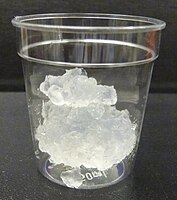
Photo from wikipedia
In this study, effect of PEDOT:PSS content on structure and properties of poly(3,4-ethylenedioxythiophene):poly(styrenesulfonate) (PEDOT:PSS)/poly(vinyl alcohol) (PVA) composite conducting fiber was systematically investigated for the first time. PEDOT:PSS/PVA composite conducting fibers… Click to show full abstract
In this study, effect of PEDOT:PSS content on structure and properties of poly(3,4-ethylenedioxythiophene):poly(styrenesulfonate) (PEDOT:PSS)/poly(vinyl alcohol) (PVA) composite conducting fiber was systematically investigated for the first time. PEDOT:PSS/PVA composite conducting fibers with various PEDOT:PSS loadings were successfully fabricated via wet-spinning technique. Correlation between PEDOT:PSS loading and performance of composite fibers was investigated by analyzing changes in chemical constitution, morphology, thermal property, conductivity, and tensile property of composite fibers. Formation of hydrogen bonding interactions was observed between PVA matrix and PEDOT:PSS conducting filler, and the interaction was enhanced with increasing PEDOT:PSS loading. As PEDOT:PSS loading increased in composite fiber, fiber conductivity increased monotonically, and surface morphology of composite fibers became regularly circular. Young’s modulus and tensile strength of composite fibers also increased with increasing PEDOT:PSS loading, while elongation at break decreased. In addition, thermal stability of composite fibers improved with increasing PEDOT:PSS loading.
Journal Title: Polymer Bulletin
Year Published: 2018
Link to full text (if available)
Share on Social Media: Sign Up to like & get
recommendations!